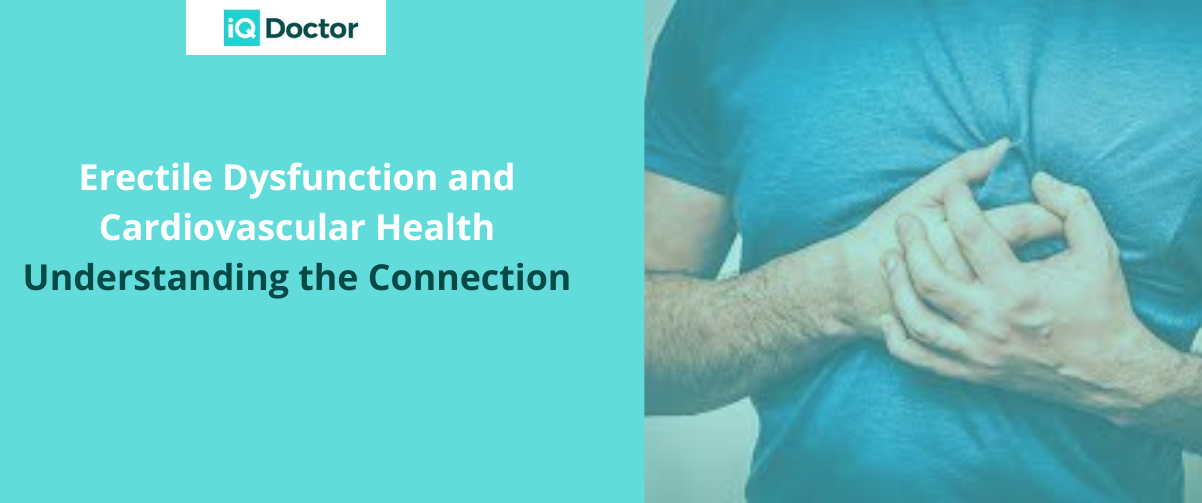Erectile Dysfunction and Cardiovascular Health Understanding the Connection
13 April, 2023 | Jane Thomas - Marketing

Erectile dysfunction (ED) and cardiovascular disease (CVD) share common risk factors and often occur together. Understanding the connection between ED and CVD is important for managing both conditions and improving overall health. Here are some key points to consider:
Shared risk factors:
Erectile dysfunction (ED) and cardiovascular disease (CVD) share many common risk factors, which can increase the likelihood of developing both conditions. Here are some of the shared risk factors:
Age Both ED and CVD become more common as men age. Aging can lead to changes in blood vessels and reduced blood flow, which can contribute to both conditions.
Smoking
Smoking damages blood vessels and reduces blood flow, which can contribute to both ED and CVD.
High blood pressure
High blood pressure can damage blood vessels and reduce blood flow, increasing the risk of both ED and CVD.
High cholesterol
High levels of cholesterol can cause plaque buildup in the arteries, reducing blood flow and increasing the risk of both ED and CVD.
Obesity
Obesity can increase the risk of both ED and CVD by contributing to other risk factors such as high blood pressure, high cholesterol, and diabetes.
Diabetes
Diabetes can damage blood vessels and nerves, leading to reduced blood flow and nerve damage that can contribute to both ED and CVD.
Sedentary lifestyle
A sedentary lifestyle often leads to weight gain and obesity, which increases the risk of both ED and CVD. Excess body fat can disrupt hormone levels and reduce testosterone production, leading to ED. It can also contribute to other risk factors such as high blood pressure, high cholesterol, and diabetes, which increase the risk of CVD.
a sedentary lifestyle can also highly increase the risk of insulin resistance and type 2 diabetes, which are risk factors for both ED and CVD. Insulin resistance can lead to damage to blood vessels and nerves, reducing blood flow and causing ED. It can also increase the risk of heart disease and stroke
Early warning sign
Erectile dysfunction (ED) can indeed be an early warning sign of cardiovascular health problems. The penile arteries are smaller than the coronary arteries, which supply blood to the heart. This means that problems with the blood vessels that supply the penis with blood may occur before problems with the larger arteries in the heart.
The reason for this is that the same underlying processes that cause the narrowing and hardening of the coronary arteries, such as a buildup of plaque, can also affect the smaller blood vessels in the penis. This can lead to decreased blood flow to the penis, which can result in difficulty achieving or maintaining an erection.
In fact, research has shown that men with ED are more likely to have underlying cardiovascular health problems, such as coronary artery disease, high blood pressure, and high cholesterol levels.
Source : (Yannas D, Frizza F, Vignozzi L, Corona G, Maggi M, Rastrelli G. Erectile Dysfunction Is a Hallmark of Cardiovascular Disease: Unavoidable Matter of Fact or Opportunity to Improve Men's Health? J Clin Med. 2021 May 20;10(10):2221. doi: 10.3390/jcm10102221. PMID: 34065601; PMCID: PMC8161068)
Therefore, if a man is experiencing ED, it is important to talk to his healthcare provider, who may recommend further evaluation for underlying cardiovascular health problems.
Impact on quality of life
ED can have a significant impact on a person's quality of life, including relationships, self-esteem, and mental health. Addressing ED and CVD together can improve overall health and well-being. ED can affect not only a person's sexual health but also their overall well-being. It can lead to a decrease in self-esteem, a strain on relationships, and a loss of interest in activities that were once enjoyable.
In addition, ED can also be a sign of underlying health problems, as discussed earlier, which can further impact a person's quality of life.
Treatment options:
Many of the treatments for ED and CVD overlap, such as lifestyle changes (e.g. diet, exercise), and medications to manage high blood pressure, high cholesterol, or diabetes,. Addressing both conditions together can help to improve outcomes and reduce the risk of future health complications.
It's important to speak with a healthcare provider if you are experiencing ED or other sexual health concerns, especially if you have other risk factors for Cardiovascular Health. They can help determine the underlying cause of your ED and recommend appropriate treatments, as well as provide guidance on lifestyle changes that can help prevent ED and improve cardiovascular health.
Reviewed By

Omar El-Gohary
The superintendent and lead pharmacist - registration number 2059792.
Omar is passionate about developing healthcare technology to empower our patients.


